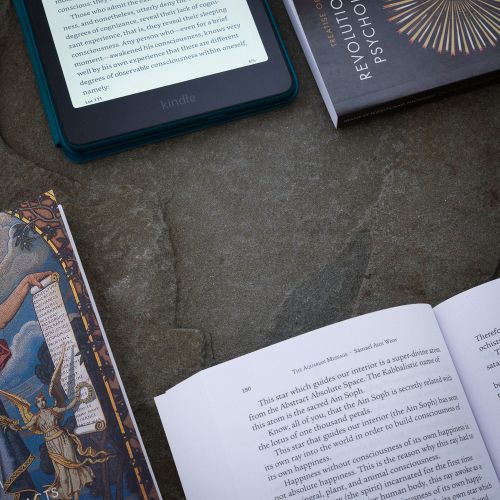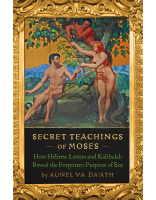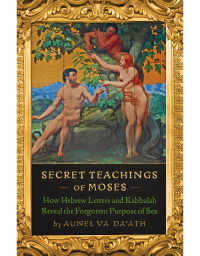And Elohim [Kether] said unto Moses, [Eheieh Asher Eheieh אהיה] “I shall become what I am becoming:” and he said, “Thus shalt thou say unto the children of Israel, I shall become hath sent me unto you.”
And Elohim [became Chokmah and] said moreover unto Moses, “Thus shalt thou say unto the children of Israel, [Iod, Hei, Vav, Hei] the Elohim of your fathers, the Elohim of Abraham, the Elohim of Isaac, and the Elohim of Jacob, hath sent me unto you: [Iod-Hei-Vav-Hei] this is my name for ever, and this is my memorial unto all generations.” —Exodus 3:14, 15
Eheieh Asher Eheieh אהיה אשר אהיה is a Tetragrammaton. Eheieh means, “I am becoming,” but of course, if we read it, we say “He shall become what He is becoming,” because we are not Kether; we are in Malkuth.
Philip saith unto him, Lord, shew us [Kether] the Father, and it sufficeth us. [Chokmah, within] Jesus saith unto him, Have I been so long time with you, and yet hast thou not known me, Philip? he that hath seen me [Chokmah: wisdom] hath seen [Kether] the Father; and how sayest thou then, Shew us [Kether] the Father? Believest thou not that I [Chokmah] am in [Kether] the Father, and [Kether] the Father in me [Chokmah]? the words [Eheieh Asher Eheieh] that I [Chokmah] speak unto you I speak not of myself: but [Kether] the Father that dwelleth in me, he doeth the works. Believe me that I [Chokmah] am in the Father, and [Kether] the Father in me [Chokmah]: or else believe me for the very works’ sake. —John 14: 8-11
Aleph, Kether (the wind) is Eheieh אהיה (I shalt become); therefore, when Kether says Asher אשר, in Hebrew this means "who," "what," or "that." So, in Hebrew Asher Eheieh אשר אהיה ("what I am becoming") implies the Sephirah Chokmah, represented in the letter Beth ב of Bereshith בראשית.
In Kabbalah, Asher Eheieh אשר אהיה also means the “one who will be.” In other words, Kether is unknowable; He is the one we do not know. But Asher Eheieh אשר אהיה (the one who will be) in the triangle of God is Chokmah (wisdom), the letter Beth ב of Bereshith , the “one who will be.”
Yet, Asher אשר by itself is the Sephirah Binah, the Holy Spirit, because in order for Chokmah-Christ to be what He is going to be (Bereshith), He needs the assistance of the Holy Spirit, which is the creative force of the universe.
These three words Eheieh Asher Eheieh אהיה אשר אהיה are related with the first triangle; these three words are related with the three primary forces. This is why these three names or words are the ones who spoke to Moses, because within Kether is Chokmah and Binah; within Chokmah is Kether and Binah; within Binah is Kether and Chokmah. In other words, within the Father is the Son and the Holy Spirit, within the Son is the Father and the Holy Spirit, within the Holy Spirit is the Son and the Father; this is why they are called the three primary forces in one—the trinity or holy tri-unity. Thus, this is the mystery of Eheieh Asher Eheieh אהיה אשר אהיה (I shall become what I am becoming).
Indeed, these three primary forces (Eheieh Asher Eheieh אהיה אשר אהיה) are those that create. In order to create, they have to unite in Daath, which is the first Garden of Eden, the first Eden that is formed in the universe.
Eden עדן is a Hebrew word that can mean “delight” or “pleasure.” Alchemically, Eden as “delight” corresponds to the upper Eden: Daath. Eden as “pleasure” is related to the lower Eden: Yesod.
So it is written:
And a river went out of Eden to water the garden; and from thence it was parted, and became into four heads. —Genesis 2:10
The upper Eden of Daath dispenses the river that springs from the first triangle; it is Chokmah, which is called the Son; Chokmah emerges in order to form the first Eden in heaven, which is delight.
Chokmah is the Sephirah related to the name Jehovah יהוה (the second Tetragrammaton—or holy name of God). This Tetragrammaton is repeated many times in the Bible. Many translations show this as Jehovah or Jah-Havah. Iod-Hei-Vav-Hei יהוה is really an androgynous name, meaning that it has the two polarities; the word androgynous comes from andros “male,” and gynika “woman.” Thus, androgynous means male-female. So, Jehovah is not a male name as many think, because the duality of God manifests in all of the Sephiroth.
From this duality, Jah-Havah יהוה, emerges the river that went out to water the garden below.
In the book of Genesis it is stated very clearly:
And םיהלא הוהי Jehovah Elohim [Binah] planted a garden eastward in Eden; and there he put the man whom he had formed. – Genesis 2:8
It does not say in Genesis 2:8 that Jehovah יהוה (which is related to Chokmah) planted a garden. It does not say that Eheieh Asher Eheieh (which is related to Kether) planted a garden. It clearly says that Jehovah Elohim יהוה אלהים, which is related to Binah and is thus the name of the Holy Spirit, planted a garden. Here, in Genesis 2:8, it is clear that Jehovah Elohim planted a garden.
Many Kabbalists state that the Father is the Sephirah Chokmah and the Mother is the Sephirah Binah, but this is a wrong interpretation, because in Hebrew Eden עדן is the delight of the union of the two polarities: Abba Elohim and Aima Elohim of Jah-Havah Elohim. This is why in The Zohar the Rabbis state that Eden (delight) is the union of Abba and Aima, Father and Mother.
The fourth commandment states “Honor thy Father and Mother” because Jah and Chavah, Abba Elohim and Aima Elohim, separately emanate through Binah (Jah-Havah Elohim) into Daath, from the first triangle. Thus, the Father and Mother that the fourth commandment refers to are not the physical father and mother that we have here in the physical plane. Rather, the fourth commandment relates to these two forces that we call Jah-Havah יהוה or Jehovah. Jah יה is a representation of the masculine force, and Havah הוה becomes Chavah חוה, which is translated as Eve (“the mother of the living”).
How do you say Eve in Hebrew? It is Chavah חוה, which is Havah הוה detached from Jah יה. Chavah חוה is the end of the name Jah-Havah or Jehovah יהוה. The Hei ה, the woman, the mother, becomes Chet ח: life, Chavah, Eve.
Jehovah is an androgynous name. Jah-Havah or Jehovah יהוה by itself is the Holy Name of God in Chokmah, but sometimes Kabbalists symbolize its two polarities in a simple manner, written with Iod י and Hei ה, pronounced “Jah.” Iod-Hei, Jah יה, implies the two polarities in the world of Atziluth—the activity of the feminine and the masculine in Jah—because Iod י symbolizes the phallus, and Hei ה symbolizes the uterus. Alchemically, by uniting the phallus with the uterus, you find the meaning of the word Jah, as in “hallelujah.”
In Hebrew, Hilel הלל means “praise,” and Jah יה is “Father-Mother.” If we just say Jah-Havah יהוה then you take the Jah יה portion as masculine, and Havah הוה as feminine; thus, whether you say just Jah יה or Jah-Havah יהוה, the word always represents the two polarities.
These two polarities of Jehovah יהוה (Chokmah) are “the two that are becoming” (Asher Eheieh). Thus, “I will Be” is: “He and She will Be.” Chokmah (Jah and Havah) is the one who, through Binah, will be Abba and Aima in Daath.
Many Kabbalists think that Chokmah is a masculine force and “is what will be,” but Chokmah is actually an androgynous force. The masculine force cannot be without the feminine, and the feminine force cannot be without the masculine. It is impossible for one polarity to exist without its opposite, and this we can prove physically: it is impossible for a man to have a child without a woman, or a woman to have a child without a man. It is impossible to have an ovum without a sperm, or a sperm without an ovum; alone, they cannot germinate. As you know, in this day and age, scientists perform experiments in the laboratories, but they always need the two polarities, the two gametes, ovum and sperm.
So behold here that Jehovah—that is, these two polarities of Jah-Havah—have to be united in the first Eden in order to create. Of course, in order to create, these two universal polarities of Jehovah need the activity of the sexual force. In order to manifest, Jehovah needs the sexual force or Binah, the Holy Spirit. In other words, Jah-Havah, when expressing itself through the sexual force, becomes Jehovah Elohim. This is an important point because the first time that you find the word Elohim in the Bible according to Kabbalah it is in the Sephirah Binah.
Binah is related to the word Elohim. Remember, Elohim is Gods and Goddesses. God is masculine and Goddess is feminine; so the word Elohim implies the duality within the plurality.
The force of the Holy Spirit manifests in Daath, and the book of Genesis is very explicit about this, it says: “And Jehovah Elohim (Binah) planted a garden eastward in Eden,” because through Binah the three primary forces create, yet the one that “will be” is Chokmah (wisdom).
Many Kabbalists make the mistake of thinking that Chokmah is the Father and Binah is the Mother. They do not understand that Chokmah/Christ is the river that emanates from Atziluth through Binah (Abba and Aima) to water the garden.
This can be easily explained by referring to the three Hebrew mother letters: Aleph א, Shin ש, and Men מ. If we do not know the position of the three Hebrew mother letters in our body, we fall into error. This is why in Gnosis we study the twenty-two Hebrew letters, and especially the three mother letters, which are related to the elements, and that emanate deep within us.







